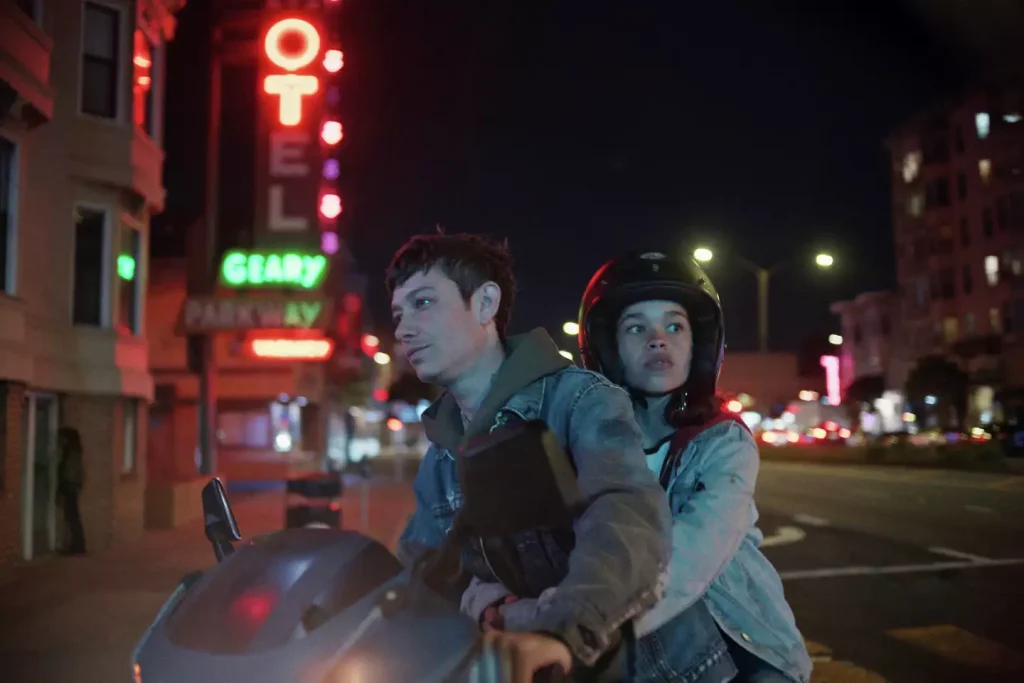You’ll know the Painted Ladies houses from Full House and the Castro from Milk; SF also plays host to glossy images of Silicon Valley start-ups and a bustling tech hub that takes on a life of its own. It’s always a little bit grey and a little bit bright, but it’s always identifiable; however, in her debut feature, US writer-director Elena Oxman turns this idea on its head very quickly. In Outerlands, San Francisco (or SF, as the locals call it, and never San Fran) is a liminal space. You’ve somehow never seen The City like this before, even though the film is distinctly set primarily within SF’s Richmond District, on the west side. The gently off-kilter nature of the film feels like a warm embrace, and audiences everywhere seem to be feeling the same way. Outerlands has been enjoying a pleasant and well-received transcontinental tour: It first enjoyed its world premiere at South by Southwest (SXSW) and then quickly headed on to its European premiere at the 2025 BFI Flare: London LGBTQIA+ Film Festival. It picked up the Torino Pride Award at the 40th Torino Lovers Film Festival before its upcoming stop as the closing film of the San Francisco International Film Festival (SFFILM Festival).
We first meet Cass (Billions star Asia Kate Dillon, who played the first nonbinary character on a network TV show) as they juggle several jobs to pay rent, including waiter and well-loved nanny. After hooking up with fellow restaurant worker Kalli (Louisa Krause), Cass is smitten. However, Kalli goes on a mysterious and abrupt trip of unspecified length, leaving her daughter Ari (Ridley Asha Batemen) for Cass to take care of—cue the unlikely friendship. Although perplexed, frustrated, and eventually worried, Cass takes the impromptu babysitter duty in stride, not even sure if they’ll ever see Kalli again (not to mention—what to do with the kid?).

Through welcoming imagery and a meandering story, Oxman cultivates a sense of a perpetual draw back to home, whether physical or metaphorical. In this case, homecoming does not mean back to a physical dwelling; rather, it is a feeling of comfort that embodies safety and community, for instance. The work’s title itself refers to an eponymous in-film, old-school video game of an astronaut trying to find and get back to the mothership—that is, trying to return home. Cass’ rediscovery of the Outerlands game that they played obsessively as a kid is like a homecoming to their own childhood.
All things considered, Cass is a great ad hoc parent, even while they struggle to access the emotionally open sides of Ari, who is in a classic pre-teen phase of rebellion: taking the bus and going to the library herself without supervision, among other things. Ari herself is in this intermediary phase epitomised by angst, perhaps prompting their newfound caregiver to think back to that time. And so, Cass rediscovers the comforts of their childhood through both Ari and all that she brings to life, finding new ways to care for their inner child. What this inner child was truly running away from through the film is largely unclear, but the open-endedness of our protagonist’s plight is part of a greater feeling of being stuck in emotional and temporal purgatory, if you will, goaded on by Kalli’s disappearance.
Even though it’s not entirely true that we mostly encounter the city at night, the moments in the film that are at night ultimately feel the most alive, drawing us and Cass back into the paradoxes embedded within: grief and joy, hope and despair. San Francisco—where Oxman used to live—after dark is Cass’ stunning heterotopia where time seems to stand still and anything is possible outside of life’s greater challenges: paying the bills and just managing to keep afloat, for one. Haunting choral music—largely from the medieval liturgical repertoire of German polymath Hildegard von Bingen, an unexpected but absolutely beautiful choice—accompanies shots in which we travel through the streets of SF. A late-film beach visit between Cass and Kalli after the latter finally returns further exemplifies this utopic feeling of no restrictions, even if life’s realities linger just beyond the boundaries of this space. Oxman’s ability to reframe a city many of us might know so well—and, by proxy, imbue it with the feeling of wondrous limbo—is a cinematic feat in and of itself.





